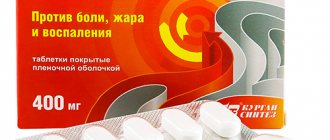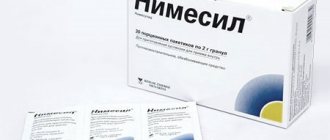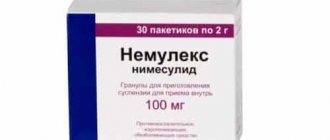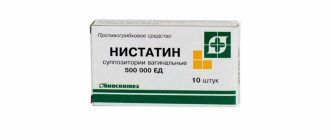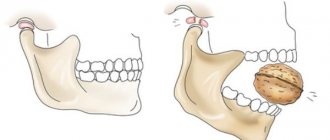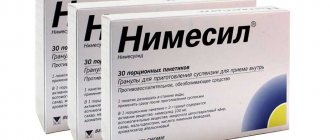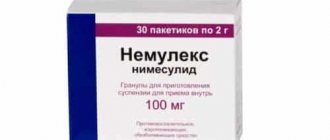Release forms and dosages
The drug is produced in granules, from which a suspension is prepared for oral administration. The granules are placed in sealed bags of 2 g. You can buy Nimesil in packages of 9, 15, 30 sachets. The drug is prescribed only to adults. For elderly people, the dosage is selected individually based on the severity of the disease and the effectiveness of the drug. Take the medicine only after meals.
Composition and active substance
The main active ingredient of Nimesil is Nimesulide. One two-gram sachet of the drug contains one hundred milligrams of the active substance. Nimesulide is supplemented with other components - sucrose, ketomacrogol, anhydrous citric acid, maltodextrin and orange flavor.
Reviews for osteochondrosis
94% of people taking Nimesil and participating in the survey noted that the drug is incredibly effective if taken to suppress the discomfort caused by spinal osteochondrosis. Here are some reviews.
Alexander, 38 years old:
“Nimesil, as well as most of its analogs, helps me with pain associated with osteochondrosis. The first time I took it for two weeks, according to the doctor’s recommendations, and now I resort to it only when necessary. By the way, it also eliminates toothache well and for a long time.”
Olga, 52 years old:
“This is the only drug that helped me with terrible pain in the spine (osteochondrosis). The popular drugs Movalis and Mydocalm did not help me at all, unfortunately.”
Review of "Nimesil" for osteochondrosis
Zhanna, 31 years old:
“I have been suffering from severe back pain for many years. I have been examined more than once, used physiotherapy and therapeutic massages. I consulted a neurologist, osteopathic doctors, even chiropractors, then there were leeches, gravity couches, massage. I can’t say that it was all in vain, but the effect did not last long. After some time, the pain worsened again. Sometimes you just want to cry from hopelessness. Doctors recommend pain relief.
For quite a long time I could not find a suitable painkiller for myself. Then I came to the conclusion that of all the medications I tried, only two helped me: Nimesil and Nice. Both contain the main active ingredient nimesulide.
Nimesil is a powder that needs to be dissolved in a small amount of warm water. It begins to act after 15-20 minutes. Sometimes the pain disappears completely, sometimes not completely, I don’t even know what to connect this with. But the effect, whatever one may say, is quite good. Of course, you shouldn’t get carried away with it, as side effects may develop in the gastrointestinal tract. “I believe that it should be taken strictly on the doctor’s recommendation.”
Evgeniy, 68 years old:
“I took the drug almost every day: I poured the contents into my mouth and washed it down with water (I was never able to prove to him that the powder needed to be dissolved). The effect develops within 30 minutes. The pain under the influence of Nimesil becomes less intense, almost imperceptible, and even a certain flexibility appears. True, the pain does not completely subside even after the blockade. The only way to get rid of pain for a day or two is, oddly enough, 100 g of regular vodka. However, you won’t last long with this method of treatment either.”
Indications
Nimesil is prescribed to reduce pain and inflammation during the treatment of the following diseases and symptoms:
- acute muscle and musculoskeletal pain;
- toothache;
- pain during the treatment of osteoarthritis;
- dysalgomenorrhea.
In addition, the drug is actively used as an antipyretic for the treatment of acute respiratory viral infections and colds of varying degrees of complexity.
Effect on the body
The drug easily overcomes histohematic barriers and is absorbed from the gastrointestinal tract within 2-3 hours after administration. About half of the drug taken is eliminated by the kidneys. Experimental studies involving patients with clinically confirmed renal failure and healthy volunteers showed that the concentration of nimesulide was within the acceptable range. However, only patients with mild and moderate stages of renal failure were allowed to participate in the study. The next time Nimesil was used, no accumulation of the active substance in the body was detected.
Popular questions about Nimesil:
Nimesil how to take the drug?
Adults and adolescents over 12 years of age are prescribed 1 sachet orally twice a day after meals.
How to dilute Nimesil?
The powder from the bag is dissolved in half a glass of warm water, mixed and the finished solution is drunk.
How to take Nimesil for toothache?
An adult and a teenager are prescribed to drink 1 sachet, which is dissolved in half a glass of water and taken twice a day. The time interval between doses is 12 hours. The single dose is not increased.
How often can you take nimesil?
Doctors prescribe the drug in a short course to eliminate pain and symptoms of inflammation. The medicine should not be taken for more than two weeks.
Contraindications
Nimesil is contraindicated in the following cases:
- children under 12 years of age;
- pregnancy and lactation;
- alcohol and drug addiction;
- high sensitivity of the body to the drug or components included in the drug;
- hyperergic and hepatotoxic reactions;
- simultaneous use of Nimesil and drugs with potential hepatotoxicity;
- any inflammatory processes of the gastrointestinal tract, perforation, peptic ulcer, bleeding;
- after undergoing coronary artery bypass surgery;
- febrile attacks and high temperature during ARVI;
- bronchial asthma, recurrent polyposis of the nose and sinuses, accompanied by intolerance to NSAIDs;
- the presence of hemorrhages and bleeding, as well as the presence of diseases accompanied by them;
- if you have problems with blood clotting;
- acute heart, liver and kidney failure.
Compatibility with other drugs
The use of Nimesil with other drugs from the glucorticosteroid group, as well as with antiplatelet inhibitors, selective inhibitors can cause bleeding and provoke the formation of ulcerative inflammation in the gastrointestinal tract. It is also possible to increase anticoagulants, which will provoke the same consequences. If treatment without the use of Nimesil and the listed drugs is unavoidable, it is important to carefully monitor the intake.
When taken simultaneously with diuretics, the components of Nimesil can weaken the effect of the latter by reducing the excretion of sodium and potassium from the body. That is why the use of the drug is not recommended for people with heart and kidney problems. The effect of antihypertensive drugs can also be reduced when taken simultaneously with Nimesil.
Blood pressure medications are also combined with Nimesil with extreme caution. This is especially true for elderly patients. It is important to monitor proper kidney function while taking the drug and regularly drink enough fluids.
The drug can reduce the clearance of lithium. As a result, the concentration and toxicity of the element in the blood plasma increases significantly. If the patient is forced to simultaneously take lithium preparations and Nimesil, it is necessary to strictly monitor lithium levels in the blood plasma.
There was no interaction between Nimesil and antacid drugs, as well as digoxin, theophylline, and cimetidine.
During the research, it was possible to establish that Nimesil can be displaced by salicylic and valproic acids from the sites of their binding to each other. However, this relationship does not affect the overall effect of taking these drugs together.
How to take Nimesil
Usually a twice daily dose is prescribed. A single dose is equal to one sachet of Nimesil. The drug dissolves in about one hundred milliliters of warm water. The suspension is drunk all at once after meals. The prepared solution cannot be stored and consumed after some time. Based on the results of monitoring the effectiveness of treatment and the severity of the patient’s condition, the dose may be increased.
Nimesil and pregnancy
Nimesil is not prescribed during pregnancy or lactation; it is contraindicated for a number of reasons. The drug provokes pregnancy complications and significantly inhibits the development of the fetus. Even small doses of Nimesil can lead to miscarriage and abnormal development of the fetus with serious consequences for the future health of the mother.
Nimesil and childhood
The drug is also contraindicated for children under 12 years of age. After 12 years, Nimesil is prescribed in the same dosage as for adults.
Nimesil in the elderly
Nimesil is prescribed to elderly patients with extreme caution. This category of patients is more susceptible than others to side effects from taking medications. In addition, older patients often already have a number of serious diseases, and taking the drug can only worsen the condition. Therefore, Nimesil is prescribed to older people in individual dosages. The treatment takes place under the strict supervision of a doctor.
Nimesil and chronic diseases
In the presence of a number of chronic diseases (heart, liver and kidney diseases), Nimesil is contraindicated. In other cases, in the presence of chronic diseases and the need to take the drug, treatment also takes place under the strict supervision of a doctor and regular laboratory tests of blood parameters and others. Nimesil is regularly prescribed for chronic rheumatic diseases.
Nimesil is one of the most effective medicines today. In addition to a pronounced analgesic effect, the drug is actively used for colds and ARVI as an antipyretic. Plus, clinical studies have found that even with an impressive list of contraindications, Nimesil is easier to tolerate, and the risk of side effects is much lower than other non-steroidal anti-inflammatory drugs.
Possible adverse reactions to Nimesil and overdose
Non-standard effects during treatment appear:
- allergies - with increased sweating, rashes, itching, erythema, urticaria, dermatitis, Lyell and Stevens-Johnson syndrome, Quincke's edema;
- problems with the hematopoietic system - anemic conditions, insufficient levels of platelets, leukocytes, red blood cells, hemorrhagic syndrome, thrombocytopenic purpura, increased number of eosinophils;
- visual and nervous disorders - panic attacks, vestibular dysfunction, cephalalgia, poor sleep with nightmares, non-inflammatory brain damage, unreasonable anxiety, drowsiness, decreased visual acuity;
- dysfunction of the circulatory system - rapid heartbeat, arterial hypertension, hot flashes, changes in blood pressure;
- pathologies of the digestive tract - dyspeptic disorders, gastritis, increased gas formation, painful sensations in the epigastric region, ulcers and perforation of the gastrointestinal tract, hepatitis, icteric discoloration of the skin, an increase in the number of liver enzymes.
When adverse reactions occur in the respiratory department, shortness of breath is observed. In other cases, there is a decrease in body temperature, hematuria, problems with urination, and asthenic syndrome.
Symptoms of an overdose of Nimesil include vomiting, apathy, nausea and drowsiness. In difficult cases, spontaneous bleeding develops in the gastrointestinal tract, sometimes there is an increase in blood pressure, acute kidney dysfunction, breathing problems, anaphylaxis, and coma.
To relieve the clinical manifestations of an overdose, symptomatic treatment is used, with gastric lavage, taking activated charcoal (1 tablet per 10 kg of weight), and an osmotic laxative. It is imperative to monitor the functionality of the liver and kidneys.
